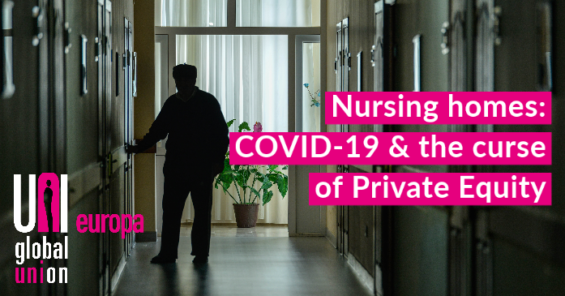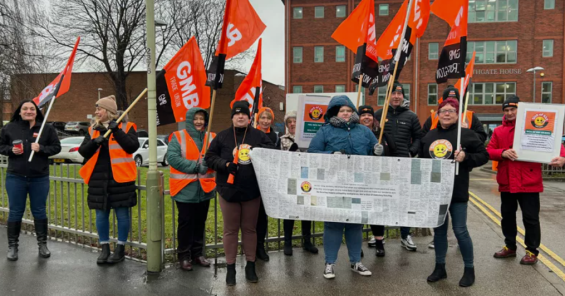The Covid-19 crisis has been devastating for nursing homes. Residents account for over a third of deaths in many countries and estimates are of hundreds of deaths among the essential workers that kept them going. Rather than being shielded from this lethal disease, our elderly were faced with equipment penuries and dangerous levels of under-staffing. Why, when it was well known that nursing homes would be key to saving lives, has the response been so inadequate? We take a look at the role of private equity in fuelling a long-term trend towards under-resourced and under-staffed nursing homes, which has stripped them of the ability to adapt to this crisis and cost lives.
This paralysis has notably made headlines in Spain, where the conditions of Zoilo Patiño’s death caused uproar across the country. The focus revealed a stripped-down “fast-food” version of elderly care driven by private equity. Meanwhile, in the USA a new study has shown that nursing facilities with private equity ownership or investors in New Jersey had higher rates of COVID-19 infections and deaths.
Across Europe, nursing homes have increasingly been bought up by private equity firms. Research from last year showed that over 50,000 nursing home beds in England were run by private equity-owned firms. In Spain, where 70% of nursing homes are privately owned, even a large chunk of the remaining publicly owned nursing homes are managed by private equity firms.
Tight-rope margins, cut-throat consequences
As distinct from “publicly floated” corporations, shares of private equity firms cannot be purchased on the stock market. Instead, these firms attract investments into funds, with which they buy over real economy companies, such as nursing homes. They then typically load these companies with debt, extracting much of the liquidity for themselves as well as their investors, leaving the debt repayments for the nursing home to pay back over years or more often decades.
A core part of their approach is leveraged buyouts, in which they use the assets of the real economy company they buy, as collateral against which to take out a loan for the purchase. Once they are in control, they often apply what is known as “asset stripping” (which partly explains why they are so attracted to “asset-rich” nursing homes that often own their buildings). One common approach is the selling off of real estate in sell-and-leaseback deals. They will often then use complex corporate structures, sometimes involving internal loans, exorbitant fees and shell companies in tax haven jurisdictions, to extract this money unhindered and untaxed.
While all these techniques are also used in the increasingly financialised world of shareholder-controlled corporations, they are pushed to an extreme within the private equity model. At the end of the process the nursing home company will likely find itself burdened with heavy debt repayments and servicing costs as well as with additional rent payments. This leaves little room for improvements in the quality of care for elderly people or for workers to negotiate better conditions or salaries. It also means that there is no flexibility to manoeuvre and adapt to exceptional circumstances, which has proven devastating in this pandemic.
The reality is that the people that run Private Equity firms do not stand to lose very much. They typically front only 2% of their own money in their funds, attracting the rest from outside investors. There have been a number of high profile examples of this process leading to the bankruptcy of care homes, notably Southern Cross and Four Seasons. Limited liability law means that, even in the case of bankruptcy, the Privat Equity firm itself only risk the minimal contribution they put in at the start. Meanwhile, part of the “attractiveness” of the nursing home sector, is that societies will not let them fail.
Refocussing on the real economy
As liquidations and bailouts loom, it is crucial that governments target their interventions and policies at the real economy rather than at safeguarding extractive practices. Giving working people, who are rooted in their communities, a real say over the management of companies has been shown to anchor decisions to the real economy. As such, UNI Europa has been advocating for all bailout funds to be made conditional on recipient companies signing collective bargaining agreements with their workers. UNI has also been defending European Works Councils from efforts by a number of corporations to undermine these spaces carved out by EU law to ensure worker participation within multinationals.
Unions have always used insight into corporate strategy in negotiations with employers. Research into private equity controlled companies can highlight when they are making liquidity available and unions can push for this money to be reinvested into the productive side of the company, be it in equipment improvements, increasing staffing and pay levels, paid leave, pensions, training etc. There is precedent for this, it was recently done by UFCW Local 400 in the USA who used insight into the corporate strategy of private equity-owned Albertsons and against expectations, got them to pay $575 million into a pension fund for workers. Needless to say the investment in research was minimal in comparison to this major win.
Of course, negotiating alone does not address the underlying structural issues we highlighted above but it is a form of mitigation of the immediate problem in and of itself. When used in tandem with advocating for policy changes, it can lastingly change longer term trends. Another avenue for unions to push for change is at the investor level. Many workers’ pension funds invest in private equity funds. As private equity investors face increased scrutiny for their role in the crisis, now is a key time to strengthen the links between workers’ priorities and the societal impact of how their capital is invested. UNI CARE is preparing further work on this, contact us if you would like to be involved.
Private equity firms get away with their extractive model, and workers suffer the consequences, only when they operate in the shadows. The more exposure is given to this extractive behaviour, the better off workers will be.


